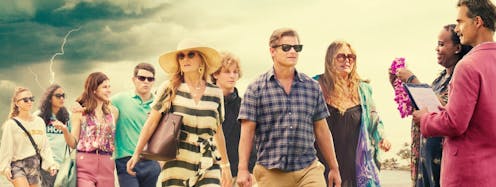Just like the satire in The White Lotus, tourism campaigns often perpetuate colonial stereotypes about the countries they are selling
- Written by Philippa Chandler, Research Fellow, The University of Melbourne

The TV series The White Lotus has returned for a second season. Both series of The White Lotus explore the underbelly of resort tourism.
The first series is set in a resort in Hawaii and contains sex, drugs and outrageously selfish behaviour. Through its focus on the interactions between wealthy American guests and local resort staff, it explores complex themes including racial inequality, the ongoing impacts of colonialism, debates about land ownership and identity politics.
The second series is set in Sicily, but the first season gives us an interesting opportunity to reflect on the way tourism destinations are marketed to appeal to wealthy tourists.
International tourism campaigns try to market the perceived “essence” of what makes a country special. In the process, they often perpetuate stereotypes. Critical tourism scholars have long argued such branding tends to overemphasise and essentialise cultural difference.
Many of the problems satirised by The White Lotus are perpetuated by a recent advertising campaign by Tourism Fiji.
The Bulanaires campaign launched in 2019 encourages international tourists to visit Fiji. The phrase Bulanaires blends the term “billionaires” with the Fijian greeting “bula”, which implies wishes of good health.
A key message in the campaign is that Fijians may not be wealthy yet are “rich in happiness”.
Read more: Fiji is officially ‘open for happiness' – will that apply to its tourism workers too?
The Bulanaires campaign is sophisticated, well-produced and full of charm and humour. However, our research into tourism tropes shows the advertising campaign also recycles some troubling stereotypes about Fijian people.
Firstly, like much advertising for the Pacific region and alongside a suite of related colonial stereotypes, the campaign romanticises poverty as a form of wellbeing. Secondly, it uncritically reinforces the colonially entrenched notion of the “happy native”.
The ‘happy native’ and the ‘smiling servant’
As they greet the incoming guests at the beginning of season one, the staff at The White Lotus are encouraged to “wave like they mean it” by their manager and to project “vagueness” to the visitors. This sense of blending into the background and performing the role of the subservient and smiling host is apparent in tourism advertising too.
In one Tourism Fiji advertisement, a smiling resort worker says to the camera “what makes me happy is seeing you happy”. Fijians are cast as the epitome of authentic happiness: pre-existing, pervasive and spontaneously felt and expressed.
The notion that all Fijians are authentically happy despite wealth disparities stems from, and reinforces, longstanding colonial tropes of the “happy native” being somehow free from the stressors of the rat race. Such fantasies are widely applied beyond the Pacific region. As tourism academic Camille O'Reilly writes, these include “a nostalgic and naïve view of the "traditional” life found outside the West, untouched by modernity but now rapidly disappearing.“
The question is not whether Fijians feel happy, but rather what the implications are of broadcasting these stereotypes of Fijian wellbeing to tourists.
The irony is that low paid work in the tourism industry often entangles them at the bottom of the capitalist hierarchy they are marketed as being untouched by.
Poverty and wellbeing
The awkward juxtapositions of wellbeing and poverty are explored in series one The White Lotus via Jennifer Coolidge’s character Tanya, a wealthy and lonely tourist who tries to forge a relationship with her Hawaiian massage therapist.
The relationship veers further towards exploitation when Tanya hints she could invest in the massage therapist’s business, on the unspoken understanding the therapist pay her additional attention. The pairing – and the ultimately unrealised investment – highlights the uneven economic circumstances between the women. What constitutes "wellbeing” for the tourist can erode the host’s wellbeing.
The relationship between wellbeing and poverty is awkwardly apparent in the Tourism Fiji campaign, which suggests Fijians are happy, despite being far poorer than tourists. It goes even further to suggest poverty even enables happiness.
“We don’t get many billionaires around here” smiles a local in the advertisement, “but we have plenty of BULANAIRES!”
The advertisement exploits the lexicon of wellbeing and mindfulness to reassure tourists the Fijians who bring them their cocktails and look after their children are content with low wages.
Read more: Freud, Nietzsche, Paglia, Fanon: our expert guide to the books of The White Lotus
Selling the connection to nature
National branding campaigns for Fiji, Vanuatu, Papua New Guinea and the Solomon Islands all depict Indigenous peoples as living somehow closer to nature than those who might wish to travel to visit them.
The advertising campaign Answer The Call To Vanuatu is a good example.
“The call” connects tourists to Vanuatu by evoking a sense of existential loss and longing. It features a conch shell trumpet sounding from an “untouched paradise” across the ocean and the internal voice of a prospective tourist crying out for adventure. It is selling escape from the rigours of everyday life, healing through connection to nature and a sense of human authenticity.
For locals, however, “answering the call” has nationalist connotations reminiscent of wartime recruitment campaigns. This message was perpetuated during COVID-19 travel bans where tourism campaigns hailed tourists through wistful narratives about future holidays, in which “the time will come to connect again” and, meanwhile, Indigenous people will “keep it beautiful for you”.
The White Lotus is a cleverly-written reminder about the colonial underpinnings of international tourism. It shows the ways in which the tourism industry is often bolstered by problematic cultural stereotypes; often complicit in widening the gap between rich and poor, visitors and hosts.
Authors: Philippa Chandler, Research Fellow, The University of Melbourne



















